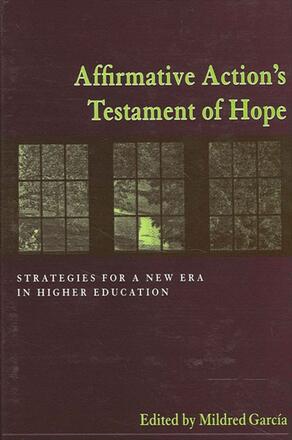
Affirmative Action's Testament of Hope
Strategies for a New Era in Higher Education
Alternative formats available from:
Focuses on affirmative action and its impact on colleges and universities since its inception in 1965. Suggests different perspectives on and approaches to affirmative action and offers and presents various voices on the impact and philosophical implications of affirmative action.
Description
As we stand at the threshold of the next century, this book begins to confront the question: how can affirmative action be constructed for the twenty-first century to protect those discriminated against at our colleges and universities? From admitting students to hiring faculty, administrators, and staff, to making tenure decisions, affirmative action has made an indelible imprint on the university environment. Over thirty years have passed since the implementation of Title VII in 1965, and questions, issues, and challenges are continually brought to the forefront. This book considers the impact of affirmative action in higher education, thereby addressing these important concerns.
At Arizona State University, Mildred García is Associate Vice Provost, Associate Director of the Hispanic Research Center, and Associate Professor in the Department of Social and Behavioral Sciences.
Reviews
"This book is mandatory reading for all higher education administrators. It is an excellent synthesis of policy, research, and practice. Affirmative Action's Testament of Hope is an excellent tool for students, faculty, administrators, policy makers, and anyone interested in higher education administration and governance." — Wynetta Y. Lee, North Carolina State University
"It is a very thought-provoking book which addresses the legal and moral questions of democracy and pluralism; a powerful shot in the arm to affirmative action defenders and raises questions for its opponents." — Parker C. Johnson, Association of American Colleges and Universities
"The topic is extremely significant for policy concerns. This book is useful for understanding the legal history of Affirmative Action." — Bruce Anthony Jones, University of Missouri-Columbia